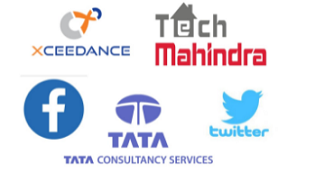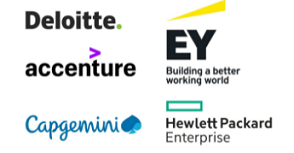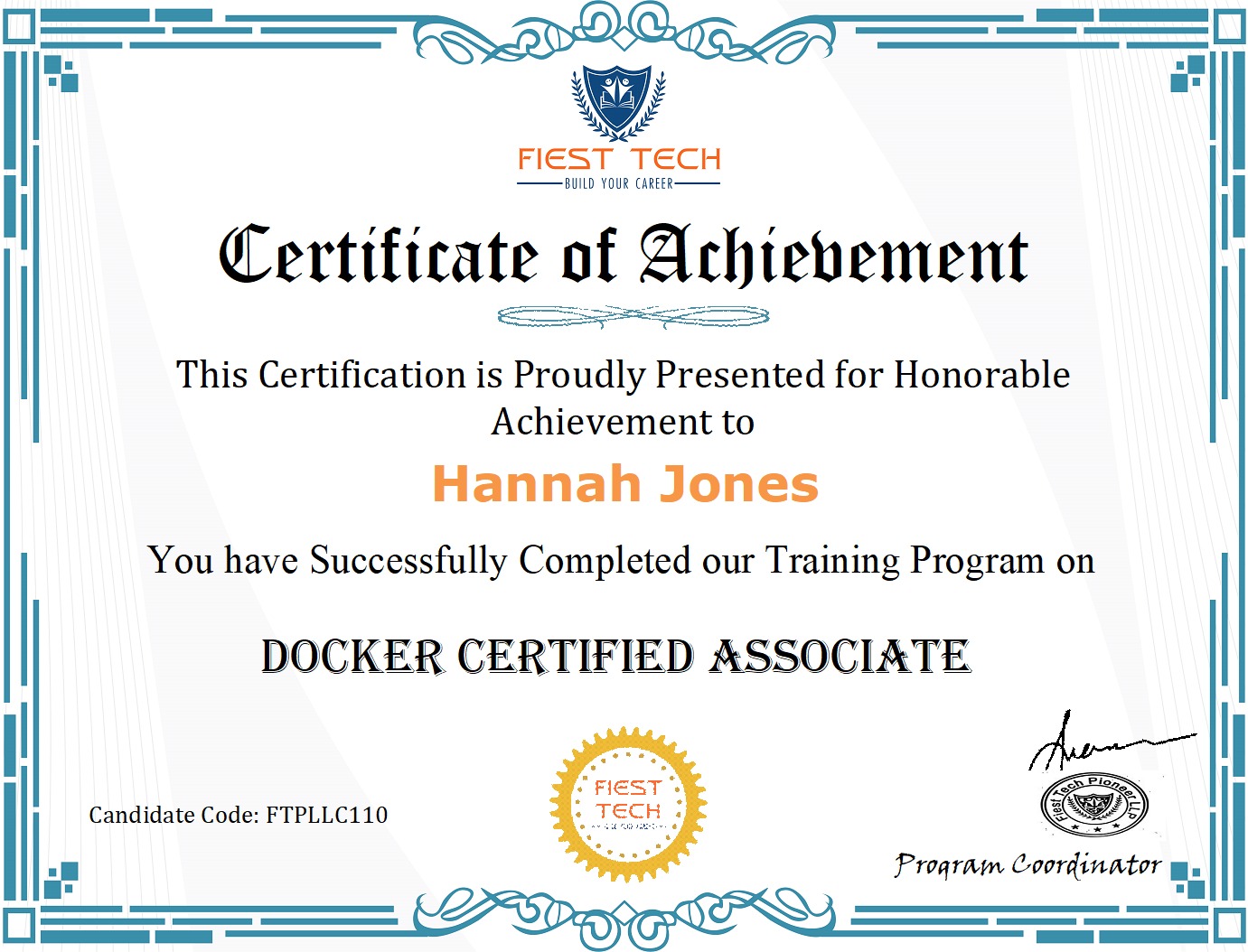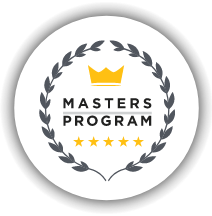Docker Online Training Course Overview
This Docker training is aligned with the Docker Certified Associate (DCA) Certification body and covers the fundamentals of Docker. You will be able to comprehend Docker and its role in the DevOps lifecycle; create images, containers, swarms, volumes, and networks; define Docker security client bundles and client-server authentication; and moreThis course serves as preparation for learners who seek to pass the Docker Certified Associate certification exam offered by Docker. Ultimately, the certification exam aims to validate one’s skills as a Docker practitioner. In this course, we will dissect both the concepts and objectives needed to use Docker effectively. Learners will also uncover how to leverage core features contained within Docker Community Edition (DCE), as well as the additional features offered through Docker Enterprise Edition (DEE).
Docker Certified Associate Dca Certification Training Key Features
At Fiesttech, we value the trust of our patrons immensely. But, if you feel that this Docker Certified Associate Dca Certification Training does not meet your expectations, we offer a 7-day money-back guarantee. Just send us a refund request via email within 7 days of purchase and we will refund 100% of your payment, no questions asked!
- 8X higher interaction in live online classes conducted by industry experts
- 2 course-end assessments
- 3 lesson-end projects
- Includes eBooks
- Lesson-end knowledge checks
- Industry-recognized Docker course completion certificate
- In-blended depth learning
- Job assist-programs
- 24x7 online assistance
Skills Covered
- Docker
- Image
- Container
- Service
- Docker Commit
- Docker commands
- Registry
- Cluster management and orchestration
- Swarm
- Node
- Network
- Storage and volumes
- Security
Benefits
The Docker Certified Associate (DCA) exam validates your skills as an experienced Docker practitioner, acting as a foundational benchmark for real-world Docker skills across the container industry. Professionals with this Docker certification will set themselves apart as uniquely qualified to run enterprise workloads at scale with Docker Enterprise Edition and may display the certification logo on their resumes and social media profiles
Annual Salary
Hiring Companies

Annual Salary
Hiring Companies

GO AT YOUR OWN PACE
Training Options
Explore all of our training options and pick your suitable ones to enroll and start learning with us! We ensure that you will never regret it!
Docker Associate Course Curriculum
Eligibility
Anyone interested in learning Docker will benefit from this Docker Certification Training. This DCA course also is well-suited for: Freshers, Software developers, Software engineers, Technical leads, System administrators.
Pre-requisites
In order to take full advantage of this Docker training course, you will need to have a solid knowledge of Linux, including hands-on experience.
Course Content
Live Course
Self Paced
-
2.01 - 1.01 Course Introduction
02:33 -
2.02 - 1.02 Exam Details
03:21 -
2.03 - 1.03 Learning Objectives
00:43 -
2.04 - 1.04 Understand Docker
04:12 -
2.05 - 1.05 Differentiate Docker and Virtualization
03:12 -
2.06 - 1.06 DevOps and Docker
01:45 -
2.07 - 1.07 Containerization
01:21 -
2.08 - 1.08 Why use Docker
02:02 -
2.09 - 1.09 Microservices
01:45 -
2.10 - 1.10 Advantages of Microservices
02:21 -
2.11 - 1.11 Docker Architecture
06:02 -
2.12 - 1.12 Summary
00:56
-
3.01 - 2.01 Learning Objectives
00:34 -
3.02 - 2.02 Docker Engine
08:56 -
3.03 - 2.03 Components of Docker Engine
02:34 -
3.04 - 2.03 Components of Docker Engine
02:02 -
3.05 - 2.04 Docker Community Edition
03:43 -
3.06 - 2.05 Docker Enterprise Edition
05:23 -
3.07 - 2.06 Pricing of Docker CE and EE
02:18 -
3.08 - 2.07 Components for Docker Enterprise
04:34 -
3.09 - 2.08 Mirantis Products for Docker Enterprise
04:54 -
3.10 - 2.09 Docker CE vs. EE
01:34 -
3.11 - 2.10 Summary
00:54 -
3.12 - 3.04 Docker Installation on Ubuntu using Docker’s Repository
03:21
-
4.01 - 3.01 Learning Objectives
00:48 -
4.02 - 3.02 Implementation of Docker Engine
02:23 -
4.03 - 3.03 Docker Installation on Ubuntu
03:34 -
4.04 - 3.05 Docker Installation on Ubuntu using Package
01:02 -
4.05 - 3.06 Docker Installation on Ubuntu using Automated Scripts
01:23 -
4.06 - 3.07 Docker Engine Uninstallation on Ubuntu
01:01 -
4.07 - 3.08 Docker Installation on CentOS
02:45 -
4.08 - 3.09 Docker Installation on CentOS using Docker Repository
03:34 -
4.09 - 3.10 Docker Installation on CentOS using Package
01:33 -
4.10 - 3.11 Docker Installation on CentOS using Automated Scripts
01:45 -
4.11 - 3.12 Docker Uninstallation on CentOS
00:34 -
4.12 - 3.13 Demo - Install Docker and its Pre-requisites
04:23 -
4.13 - 3.14 Docker Client
01:49 -
4.14 - 3.15 Docker Client Configuration
04:23 -
4.15 - 3.16 Docker Registry
07:33 -
4.16 - 3.17 Docker Images
04:56 -
4.17 - 3.18 Dockerfile
03:22 -
4.18 - 3.19 Create Dockerfile
01:32 -
4.19 - 3.20 Dockerfile – Benefits and Use Cases
03:34 -
4.20 - 3.21 Dockerfile Build
04:23 -
4.21 - 3.22 Demo - Docker Build
03:11 -
4.22 - 3.23 Building Docker Containers
01:23 -
4.23 - 3.24 Docker Container Lifecycle
03:11 -
4.24 - 3.25 Docker Container Lifecycle Management Commands
06:33 -
4.25 - 3.26 Container Lifecycle Management – Stop Pause or Unpause Restart
01:13 -
4.26 - 3.27 Docker Machine
04:54 -
4.27 - 3.28 Demo - Execute Docker containers commands
08:00 -
4.28 - 3.29 Demo - Working with Containers
04:53 -
4.29 - 3.30 Summary
01:00
-
5.01 - 4.01 Learning Objectives
00:45 -
5.02 - 4.02 Docker Base Images
04:33 -
5.03 - 4.03 Accessing Docker Images
07:43 -
5.04 - 4.04 Custom Image
04:43 -
5.05 - 4.05 Demo - Working with Docker Images
18:22 -
5.06 - 4.06 Working with Docker Registry
02:33 -
5.07 - 4.07 Basic Authentication on Docker Registry
01:01 -
5.08 - 4.08 Utilize Search in a Registry
01:22 -
5.09 - 4.09 Dockerfile Directives
12:23 -
5.10 - 4.10 Validating Docker Image
02:21 -
5.11 - 4.11 Publishing Image to Docker Hub
01:21 -
5.12 - 4.12 Demo - Create Docker Images for Apache Web Server
04:22 -
5.13 - 4.13 Transfer Docker Images
05:22 -
5.14 - 4.14 Demo - Show Difference between copy and Add Command
04:42 -
5.15 - 4.15 Demo - Show Difference between entry point and CMD
02:22 -
5.16 - 4.16 Summary
01:22
-
6.01 - 5.01 Learning Objectives
00:21 -
6.02 - 5.02 Naming Containers
05:32 -
6.03 - 5.03 Docker Container Deployment
03:22 -
6.04 - 5.04 Listing Docker Container
05:22 -
6.05 - 5.05 Docker Container Logs
03:43 -
6.06 - 5.06 Run Time Configurations
02:22 -
6.07 - 5.07 Containers and Applications
02:33 -
6.08 - 5.08 Application Containerization Benefits and Drawbacks
02:33 -
6.09 - 5.09 Binding Containers with Host or Port
03:52 -
6.10 - 5.10 Inspect Container Processes
05:22 -
6.11 - 5.11 Demo - Docker Container Logs
03:33 -
6.12 - 5.12 Demo - Binding Containers with Host Post
02:22 -
6.13 - 5.13 Summary
00:33
-
7.01 - 6.01 Learning Objectives
00:20 -
7.02 - 6.02 Introduction to Docker Network
01:23 -
7.03 - 6.03 Container Network Model
03:22 -
7.04 - 6.04 Network Drivers
04:22 -
7.05 - 6.05 Bridge Network
03:45 -
7.06 - 6.06 Host Network
04:43 -
7.07 - 6.07 None Network
01:31 -
7.08 - 6.08 Overlay Network
02:00 -
7.09 - 6.09 Macvlan Network
03:31 -
7.10 - 6.10 Docker Container with Custom Network
02:32 -
7.11 - 6.11 Docker Network Management
00:34 -
7.12 - 6.12 Summary
00:44 -
7.13 - 6.13 Demo - Docker Networks
03:00
-
8.01 - 7.01 Learning Objectives
00:32 -
8.02 - 7.02 Docker Container Orchestration
03:43 -
8.03 - 7.03 Container Orchestration Tools
04:23 -
8.04 - 7.04 Docker Compose
09:43 -
8.05 - 7.05 Demo - Docker Compose
05:34 -
8.06 - 7.06 Docker Swarm
02:14 -
8.07 - 7.07 Docker Swarm Architecture
04:22 -
8.08 - 7.08 Docker Swarm Features
04:23 -
8.09 - 7.09 Docker Swarm Setup
02:24 -
8.10 - 7.10 Quorum in a Swarm Cluster
02:34 -
8.11 - 7.11 Docker Services
07:44 -
8.12 - 7.12 Demo - Docker Swarm
11:13 -
8.13 - 7.13 Summary
00:33
-
9.01 - 8.01 Learning Objectives
00:43 -
9.02 - 8.02 Overview of Storage Drivers
00:56 -
9.03 - 8.03 Storage Types
01:45 -
9.04 - 8.04 Working with Storage Drivers
01:04 -
9.05 - 8.05 Device Mapper
02:45 -
9.06 - 8.06 Demo - Change Storage Driver
07:54 -
9.07 - 8.07 File System in Containers
08:34 -
9.08 - 8.08 File System Mount
06:56 -
9.09 - 8.09 Introduction to Docker Volume
02:22 -
9.10 - 8.10 Demo - Create Bind Mount Directory
03:12 -
9.11 - 8.11 Demo - Create Docker Volume and Attach to Container
02:12 -
9.12 - 8.12 Summary
00:49
-
10.01 - 9.01 Learning Objectives
00:45 -
10.02 - 9.02 Container Security
02:32 -
10.03 - 9.03 DTR Webhooks
00:54 -
10.04 - 9.04 UCP Client Bundles
01:23 -
10.05 - 9.05 LDAP
01:23 -
10.06 - 9.06 MTLS (Mutual Transport Layer Security)
02:33 -
10.07 - 9.07 Docker Content Trust (DCT)
04:44 -
10.08 - 9.08 Namespaces
01:23 -
10.09 - 9.09 Control Groups
01:21 -
10.10 - 9.10 Summary
00:56

Docker Certified Associate Dca Certification Training Exam & Certification
The Docker Certified Associate (DCA) exam validates your skills as an experienced Docker practitioner, acting as a foundational benchmark for real-world Docker skills across the container industry. Professionals with this Docker certification will set themselves apart as uniquely qualified to run enterprise workloads at scale with Docker Enterprise Edition and may display the certification logo on their resumes and social media profiles.
-
Cloud professionals
-
Developers
-
Solutions architects
-
Testers
-
Release engineers
-
Systems administrators
It consists of 55 questions to be completed over 80 minutes, covering essential skills on the Docker Enterprise Edition.
The registration fee for the DCA exam is $195.
After having completed the Docker Certified Associate exam, you will get your results immediately via a score report on the testing screen.
The DCA certification has a validity of two years.
If you fail to clear the Docker Certification exam in the first attempt, you may retake the exam after 14 days.
To obtain the Docker Course certification, you must:
- Complete 85 percent of the online self-learning course or attend 1 complete batch of this training
- Pass any one of the course-end assessment tests with a minimum score of 80 percent
To take up the Docker certification exam, you must have a computer with:
- Chrome or Chromium browser
- Strong internet access
- Webcam
- Microphone, speakers, and headset
Yes, we provide a practice test as part of this Docker Training to help you prepare for the actual Docker certification exam. You can try this free Docker Certified Associate Exam Dumps to understand the type of tests that are part of the DCA certification curriculum.

FAQS
Docker Certified Associate Dca Certification Training Course FAQs
Docker is one of the most important and widely used tools in the DevOps pipeline. It makes creating, deploying, and running applications easier by using containers.
Docker is the tool that developers use locally to build, manage, and distribute containers. Docker is one of the most sought after skills among the various tools in the DevOps toolchain, garnering a salary of $100K+ in the United States. Top companies, including Adobe, SAP, VMware, and IBM, use Docker in their DevOps methodologies.
After learning Docker, you can shift to a career in DevOps. Docker is one of the fundamental tools in the DevOps pipeline. Job roles suitable for individuals with Docker certification are:
DevOps engineer
DevOps consultant
Release manager
DevOps architect
You can enroll for the DCA certification at our website and make an online payment using any of the following options:
· Visa credit or debit card
· MasterCard
· American Express
· Diner’s Club
· PayPal
Once payment is received, you will automatically receive a payment receipt and access information via email.
All of the Docker classes are conducted live online. They are interactive sessions that enable you to ask questions and participate in discussions during class time. We do, however, provide recordings of each session you attend in this Docker course for your future reference.
The other DevOps courses include –
Post Graduate Program in DevOps
Certified Kubernetes Administrator (CKA) Certification Training Course
CI/CD Pipelines with Jenkins Certification Training Course
Ansible Foundation Training Course
DevOps Engineer Certification Training
Once you are through with this Docker Course, on completion of the Docker Certified Associate (DCA) Exam, you can consider taking up the Post Graduate Program in DevOps that can fast track your career growth by helping you gain expertise in the field of DevOps.
According to PayScale, a DevOps engineer with Docker skills earns an average salary of Rs.847K in India and $100K in the USA. After achieving the DCA certification, there is no reason why you can’t achieve even higher.
DevOps is a promising career option these days. Among the various tools used in DevOps, Docker is a popular tool used by companies worldwide. Proficiency in Docker will make you more employable and you’ll stay ahead of your competitors.
Familiarity with the Linux operating system is all you need to get started with this Docker training program
Siemens, TCS, SAP Labs, Cisco Systems, and Directi are some of the top companies that hire for various roles that require Docker skills. Becoming a Docker-Certified Associate through this Docker course further improves your chances of getting hired.
Developers need to work with multiple languages, architectures, and frameworks apart from just writing code to develop applications these days. The discontinuous interfaces between tools for each lifecycle stage create much complexity. Docker is a tool that simplifies and accelerates the workflow by giving developers the freedom to choose the tools, deployment environments, and application stacks for their projects.
If you are passionate about learning Docker, it would take you around three months to become familiar with its features and concepts
- Adobe
- AT&T
- Netflix
- PayPal
- Splunk
- Verizon
Container technology has garnered a lot of attention these days. Running applications on Docker offers portability and performance benefits that make the development process more responsive and agile. Containers have much smaller footprints compared to virtual machines and are faster to create and start quickly. So, it makes sense to learn Docker.
Today, many companies are containerizing their applications for faster production workloads so that they can be deployed anytime. Docker is one of the popular containerization tools trusted by companies across the world.
So, a Docker Certified Associate certification is in high demand as it demonstrates your expertise, skills, and knowledge in using the tool.
Apart from the Docker course, Fiest Tech also offers Docker Certified Associate exam dumps for free. The questions are updated regularly to align with the actual DCA exam.
A number of online tutorials are available that can explain the basics of Docker. However, we recommend that you enroll in Fiest Tech's Docker Certified Associate training as it covers a cutting-edge curriculum designed by industry experts. Apart from theoretical knowledge, there are integrated labs to help you gain practical exposure.
Officially, there is the only certification associated with the Docker tool, namely Docker Certified Associate (DCA).
Docker is actually a software framework used to build, run, and maintain containers on servers and the cloud. The language used for writing Docker files is the Go programming language.
As Docker is witnessing continued adoption among companies, developers who learn Docker will have a competitive advantage over their peers. The tool has been rated among the most loved and most wanted platforms in the Stack Overflow survey. So, you should take a Docker training course and upgrade your skills.
As mentioned on its official website, Docker is used to develop, ship, and run applications. It allows users to separate their applications from their infrastructure so that they can deliver software quickly.
Related Programs
Cloud Computing Related Programs






